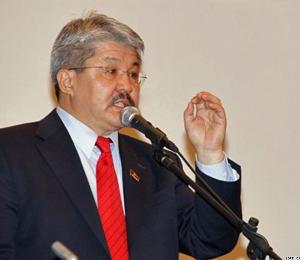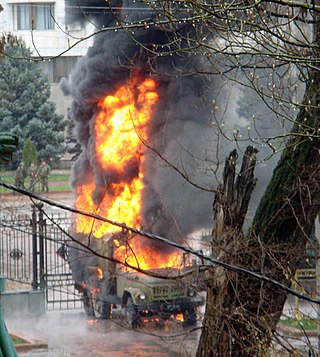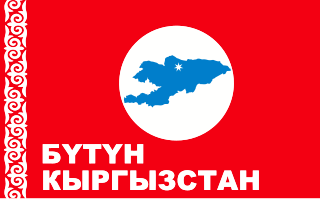
The history of the Kyrgyz people and the land now called Kyrgyzstan goes back more than 3,000 years. Although geographically isolated by its mountainous location, it had an important role as part of the historical Silk Road trade route. Turkic nomads, who trace their ancestry to many Turkic states such as the First and Second Turkic Khaganates, have inhabited the country throughout its history. In the 13th century, Kyrgyzstan was conquered by the Mongols; subsequently it regained independence but was invaded by Kalmyks, Manchus, and Uzbeks. In 1876, it became part of the Russian Empire, remaining in the USSR as the Kirghiz Soviet Socialist Republic after the Russian Revolution. Following Mikhael Gorbachev's democratic reforms in the USSR, in 1990 pro-independence candidate Askar Akayev was elected president of the SSR. On 31 August 1991, Kyrgyzstan declared independence from Moscow, and a democratic government was subsequently established.

The politics of Kyrgyzstan, officially known as the Kyrgyz Republic, takes place in the framework of a presidential system representative democratic republic, whereby the President is head of state and the Chairman of the Cabinet of Ministers is head of government. Executive power is exercised by the government. Legislative power is vested in both the government and parliament. The Economist Intelligence Unit rated Kyrgyzstan an "authoritarian regime" in 2022.
The Tulip Revolution, also known as the First Kyrgyz Revolution, led to then-President Askar Akayev's fall from power. The revolution began after parliamentary elections on 27 February and 13 March 2005. The revolutionaries alleged corruption and authoritarianism by Akayev, his family and supporters. Akayev fled to Kazakhstan and then to Russia. On 4 April 2005, at the Kyrgyz embassy in Moscow, Akayev signed his resignation statement in the presence of a Kyrgyz parliamentary delegation. The resignation was ratified by the Kyrgyz interim parliament on 11 April 2005.

The president of Kyrgyzstan, officially the president of the Kyrgyz Republic, is the head of state and head of government of the Kyrgyz Republic. The president directs the executive branch of the national government, is the commander-in-chief of the Kyrgyz military and also heads the National Security Council.

Felix Sharshenbayevich Kulov is a Kyrgyz politician who served as the 9th Prime Minister of Kyrgyzstan from 2005 to 2007, following the Tulip Revolution. He first served from 1 September 2005 until he resigned on 19 December 2006. President Kurmanbek Bakiyev reappointed him acting Prime Minister the same day, but parliamentary opposition meant Bakiyev's attempts to renominate Kulov in January 2007 were unsuccessful, and on 29 January the assembly's members approved a replacement.

Kurmanbek Sali uulu Bakiyev is a Kyrgyz politician who served as the second president of Kyrgyzstan from 2005 until his removal from office as a result of the Kyrgyz Revolution of 2010, forcing Bakiyev to flee the country.

Presidential elections were held in Kyrgyzstan on 10 July 2005. The result was a landslide victory for acting President Kurmanbek Bakiyev, marking the end of his interim government formed after the previous president, Askar Akayev, was overthrown in the revolution in March 2005.

The Social Democratic Party of Kyrgyzstan (SDPK) was a centre-left political party in Kyrgyzstan. The SDPK was one of the oldest and largest political parties in the country. The party took an active part in the Tulip Revolution and the 2010 Revolution. The party's members included three presidents of Kyrgyzstan: Roza Otunbayeva, Almazbek Atambayev and Sooronbay Jeenbekov.

Almazbek Sharshen uulu Atambayev is a Kyrgyz politician who served as the President of Kyrgyzstan from 1 December 2011 to 24 November 2017. He was Prime Minister of Kyrgyzstan from 17 December 2010 to 1 December 2011, and from 29 March 2007 to 28 November 2007. He served as Chairman of the Social Democratic Party of Kyrgyzstan (SDPK) from 30 July 1999 to 23 September 2011.

Early parliamentary elections were held in Kyrgyzstan on 16 December 2007. The election was called by President Kurmanbek Bakiyev after the constitutional referendum on 21 October 2007 approved a new electoral system and constitutional reform proposals, enlarging the parliament to 90 MPs and introducing party-list voting.

Bakyt Beshimov is a leader of parliamentary fraction and deputy chairman of Social Democratic Party of Kyrgyzstan. Bakyt Beshimov is a prominent opposition leader, famous for his liberal views, and speaking out against Kurmanbek Bakiyev's and Askar Akayev's regimes.
United People's Movement is a coalition currently active in Kyrgyzstan. The coalition was formed in December, 2008 as an umbrella group representing various factions in opposition to Kyrgyz President Kurmanbek Bakiyev, and includes parties such as Ata Meken, Ak Shumkar, Asaba and Jany Kyrgyzstan, as well as the Social Democrats – which is the only party represented in parliament besides the ruling, and pro-Bakiyev, Ak Zhol.

Early presidential elections were held in Kyrgyzstan on 30 October 2011 to replace Interim President Roza Otunbayeva. Former Prime Minister Almazbek Atambayev of the Social Democratic Party of Kyrgyzstan won in the first round.

The 2010 Kyrgyz Revolution, also known as the Second Kyrgyz Revolution, the Melon Revolution, the April Events or officially as the People's April Revolution, began in April 2010 with the ousting of Kyrgyz president Kurmanbek Bakiyev in the capital Bishkek. It was followed by increased ethnic tension involving Kyrgyz people and Uzbeks in the south of the country, which escalated in June 2010. The violence ultimately led to the consolidation of a new parliamentary system in Kyrgyzstan.

The Constitution of Kyrgyzstan was the supreme law of the Kyrgyz Republic. The constitution in force from 2010 until 2021 was passed by referendum on June 27, 2010, replacing the previous constitution. It introduced a strong parliament to the country, reducing the power of the historically strong president. The constitution is similar in many ways to the previous one.

Presidential elections were held in Kyrgyzstan on 15 October 2017. Incumbent President Almazbek Atambayev was not allowed to run again because the constitution sets a single six-year term for the head of state. Eleven candidates registered for the race, and from this field Sooronbay Jeenbekov of the Social Democratic Party of Kyrgyzstan won more than 50% of the vote, avoiding a runoff. Following certification of the results on 30 October, Jeenbekov was inaugurated as President of Kyrgyzstan on 24 November.

United Kyrgyzstan is a nationalist political party in Kyrgyzstan founded in 2010. It is generally more popular in the south of the country. The party is led by Adakhan Madumarov, who unsuccessfully ran for president of Kyrgyzstan in 2011 and 2017, coming second and third, respectively. It holds an ethnic nationalist ideology and supports a presidential system of government. The party was originally created to support Kyrgyz migrant laborers in Russia. The party won its first seats in the Supreme Council in the October 2020 parliamentary election, which was subsequently annulled. The party passed the 3% threshold in the 2021 parliamentary election and therefore is represented in the national legislature.

Parliamentary elections were held in Kyrgyzstan on 4 October 2020. The results showed that pro-government parties had won a supermajority of seats. The election was subsequently annulled by the Central Election Commission during the 2020 Kyrgyzstan protests.

The 2020 Kyrgyz Revolution, also known as the Third Kyrgyz Revolution or October Events, began on 5 October 2020, in response to the previous day's parliamentary election that was perceived by protestors as unfair, with allegations of electoral fraud. The results of the election were annulled on 6 October 2020. On 12 October 2020, President Jeenbekov announced a state of emergency in the capital city of Bishkek, which was approved by Parliament the following day. Jeenbekov resigned on 15 October 2020.

The Social Democrats is a political party in Kyrgyzstan founded in late 2019 by supporters of former President Almazbek Atambayev – legal successor from the Social Democratic Party of Kyrgyzstan (SDKP). After a conflict between Atambaev and his successor President Sooronbai Jeenbekov emerged and deepened in 2018, Atambayev accused of Jeenbekov in attempting to seize authority over the SDKP, a party that Atambayev himself formed in 1990s and served as a leader of. The SDK participated in the annulled 2020 parliamentary election. The current party leader is Temirlan Sultanbekov.





















